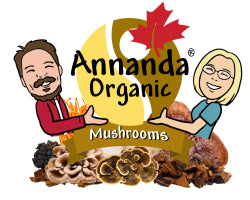Supplement your Diet with Vitamin Rich Chaga

Vitamins are nutrients that the body cannot create, so we must consume them in our diet. The exception however is vitamin D which the body can produce on its own. Despite its name, vitamin D is not a vitamin, but a prohormone, or precursor of a hormone.
Vitamin D is essential for several reasons, including maintaining healthy bones and teeth. It may also protect against a range of diseases and conditions, such as type 1 diabetes. Vitamin D by nature is an anti-inflammatory. Deficiency causes immune system weakness and chronic inflammation.
A recent study entitled 'Vitamin D supplementation to prevent acute respiratory tract infections' claims to find evidence that vitamin D prevents respiratory infections, especially in older adults whose vitamin D levels are low.
Although its specific role in corona virus infections is still unknown, researchers vouch for its effectiveness in boosting the immune system. The study suggests that deficiency in vitamin D may be a factor in one's deteriorating condition, should they be contracted with COVID-19.
"I am a HUGE fan of Annanda Chaga. I have made your chaga part of my health regime for the last five years. I used to get really ill - the flu - at least twice a year. It would knock me down and out. Since chaga, I have been sick once - in January of 2020, along with my son and husband. I believe we all got the Covid virus at the same time. I knew it was a different kind of flu virus, and it felt like it was going to hit me like a sledge hammer. But Chaga saved us. I had us all consume strong brews non-stop for three days. By the third day, we were okay and it tapered off very fast after that, and left without a trace. So - I tell everyone I can about your chaga, and I wish there were brews of it set-up in all the nursing homes, schools, hospital and shelters. Maybe ONE day! :-)"
- Daliah B.California USA
Mushrooms are the only food that contain vitamin D, naturally. All other natural food sources of vitamin D are of animal, poultry or seafood origin. Also, some foods, such as milk, orange juice and cereals may be fortified with vitamin D, up to 100 IU.
Vitamin D Significantly Reduces Complications and Death Among COVID-19 Patients
Cultivated mushrooms contain a plant sterol called ergosterol, which is the precursor of Vitamin D². In fresh mushrooms, ergosterol is stimulated to convert to vitamin D² by ultraviolet light, either from sunlight or artificial lights.
Humans manufacture our own antibiotic through vitamin D stimulation. Vitamin D promotes production of cathelicidin, a protein with antibiotic properties. Cathelicidin kills viruses, bacteria, fungi, and parasites. The more vitamin D in our system the more the body makes this antibiotic.
According to the study Photobiology of vitamin D in mushrooms and its bioavailability in humans, “Mushrooms exposed to sunlight or UV radiation are a good source of vitamin D2.”
Additionally, the study states, “The bio availability of vitamin D2 in mushrooms compared with the bio availability of vitamin D2 or vitamin D3 in a supplement revealed that ingestion of 2000 IUs of vitamin D2 in mushrooms is as effective as ingesting 2000 IUs of vitamin D2 or vitamin D3 in a supplement in raising and maintaining blood levels of 25-hydroxy vitamin D which is a marker for a person’s vitamin D status.”
The study concludes with something that we love to share with those interested in the wonderful world of fungi. “Mushrooms are a rich source of vitamin D2 that when consumed can increase and maintain blood levels of 25-hydroxyvitamin D in a healthy range.”
Dr. John Cannell of the Vitamin D Council recommends taking 50,000 IU daily of vitamin D at the fist sign of the flu for 5 days. Then dropping the level down to 5-10,000 IU daily. There is overwhelming evidence that vitamin D prevents infection. World authorities on vitamin D verify that up to 30,000 IU daily for a healthy adult is quite safe and that periodic higher does 50,000 IU daily for 5 days are also of no concern. Vitamin D works even better if taken with vitamin K2. Both are anti-inflammatory and can prevent as well as treat infections successfully.
In addition to Vitamin A, fiber, and potassium, chaga is rich in a host of vitamins, including amino acids, B-complex vitamins, and ergosterol - vitamin D2. One can also benefit from a host of minerals like calcium, cesium, copper, iron, magnesium, manganese, rubidium, selenium and zinc. View our latest mineral panel lab report detailing mineral levels in Annanda chaga.
Read more insightful articles on the Annanda Chaga Mushrooms Blog
Take our twitter poll if you agree or disagree



